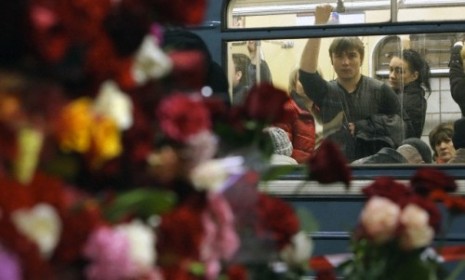How bad is Russia's terrorist problem?
The Moscow subway bombings have ignited fears of a new wave of attacks inside Russia by Chechen rebels

A free daily email with the biggest news stories of the day – and the best features from TheWeek.com
You are now subscribed
Your newsletter sign-up was successful
Russians are bracing for more suicide attacks after last weekend's Moscow metro bombings, which killed 39 commuters. The strikes may have been revenge for the recent killing of the "Russian bin Laden," Islamist warlord Said Buryatsky. Chechen rebel leader Doku Umarov, self-proclaimed emir of the North Caucasus Islamic State, has claimed responsibility for the attacks — authorities believe the two bombers were part of a 30-strong brigade of female Islamist terrorists trained by Buryatsky — and warned of more violence to come. Just how bad is Russia's terrorism problem? (Watch a Fox report about the Russian bombings)
The "black widows" are a formidable threat: "Since the first female suicide bomber blew herself up in 2001," says Nabi Abdullaev in The Moscow Times, "so-called 'black widows' have participated in two-thirds of the nearly 40 rebel attacks that have killed about 900 people in Russia through Monday." And the fear caused by the attacks is magnified by the public's shock that women would be "willing to kill and die for their cause."
"Analysis: Bombings look like the revenge of 'black widows'"
The Week
Escape your echo chamber. Get the facts behind the news, plus analysis from multiple perspectives.

Sign up for The Week's Free Newsletters
From our morning news briefing to a weekly Good News Newsletter, get the best of The Week delivered directly to your inbox.
From our morning news briefing to a weekly Good News Newsletter, get the best of The Week delivered directly to your inbox.
Buryatsky's dead, but still dangerous: There's a reason the Russians aren't expressing "much relief at Buryatsky's death," says Paul Quinn-Judge in Foreign Policy. He's an "online legend," whose letters and video messages are inspiring a new wave of Web-savvy jihadists who dream of forming an Islamist state in the North Caucasus, and who, "like Buryatsky, dream of dying a martyr's death."
This may have been an isolated incident: It had been six years since the last Moscow subway attack, and "many Russians thought that terrorism had been largely subdued in the country," says Alexei Malashenko in The Moscow Times. It's too early to declare the subway bombings the "opening salvo in a new round of terrorism." This could be an isolated incident — only time will tell whether the terrorists are capable of striking again, and again.
A free daily email with the biggest news stories of the day – and the best features from TheWeek.com
It's already clear that Russia's anti-terrorism strategy isn't working: Russia thought it had contained the threat, says David Satter in National Review, by placing Ramzan Kadyrov, a former rebel, in charge in Chechnya and giving him "carte blanche to rule the country" under a "reign of terror." But all that did was drive new recruits into the Islamists' camp. The "black widow" attacks proved that repression can't contain terrorism.
-
 Local elections 2026: where are they and who is expected to win?
Local elections 2026: where are they and who is expected to win?The Explainer Labour is braced for heavy losses and U-turn on postponing some council elections hasn’t helped the party’s prospects
-
 6 of the world’s most accessible destinations
6 of the world’s most accessible destinationsThe Week Recommends Experience all of Berlin, Singapore and Sydney
-
 How the FCC’s ‘equal time’ rule works
How the FCC’s ‘equal time’ rule worksIn the Spotlight The law is at the heart of the Colbert-CBS conflict